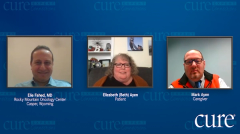
Final Thoughts on Adapting to Life with Multiple Myeloma
Beth shares final thoughts and advice on adapting to life with multiple myeloma, and Elie Fahed, MD, concludes with a summary of key take home messages.
Episodes in this series

Elie Fahed, MD: How have you adapted to life with multiple myeloma? You have been doing this for 23 years. It is part of you now. You have probably lived with myeloma almost more than without myeloma. It is a part of life you can remember.
Elizabeth Ayen: Right, exactly. I’ve had this almost half my life. It is part of who I am. I guess my goal is to help others as much as I can through what I’ve gone through—what I’ve experienced and gone through. It is just normal for me, and I do not worry as much as I did at the beginning. I would worry every single appointment: “What’s going to happen?” Now I just trust that we will have something to do next. Even though this last time was really scary, I knew that there was something you could help find for me. I just live my life. I did have to retire from teaching because of all the different side effects that I was experiencing at the time and not being able to see very well. At that point, I had such fatigue and weakness. I did retire, so I’m not working anymore.
Elie Fahed, MD: You did well just before COVID-19, so you don’t have to worry about exposure. But if you’re feeling or getting better, maybe you will go back to work.
Elizabeth Ayen: Maybe so. We will see.
Elie Fahed, MD: We will see. Any last advice you want to give other patients or caregivers?
Elizabeth Ayen: Listen to your doctor. Caregivers need to listen to their patient, whoever it is. As Mark was saying, just listen to what they are saying to you: “I am having pain. I am not feeling well.” Because as we talked about, we do not look sick, but we are experiencing a lot of issues. We also need to listen to our caregivers because they are doing so much for us. We just need to give them some grace and understand that they do not always know. Be careful to maintain those relationships the best that you can, and do not alienate them, which is something that I read about a lot on those Facebook groups. People cannot figure it out. Listen to each other, and understand that nobody is perfect. That is what I think about that.
Elie Fahed, MD: Thank you for sharing all this with us. Thank you for being supportive of other patients. You are doing well, and you are helping others do better. Your story is an amazing success story so far in terms of myeloma—being alive for 20 years and ongoing. The story of multiple myeloma is fascinating. Twenty to 25 years ago we had basic chemotherapy regimens that were toxic and did not work as well. The average survival duration was two to three years. Today patients diagnosed will have at least 10 years of expected survival on average. We have many patients who are living way longer, for 15 or 20 years. This is without taking into account all the new treatment in the pipeline, whatever will be approved next month or even next year. I am very hopeful that, one day, we will be able to cure it either with treatment or make it a chronic condition like diabetes or high blood pressure, where you need some form of treatment for life but you will not die from it. A lot of patients are responding. They are living longer; they are doing better. Treatments are well tolerated with very few side effects. Hopefully, we will keep improving over time.
This transcript has been edited for clarity.
